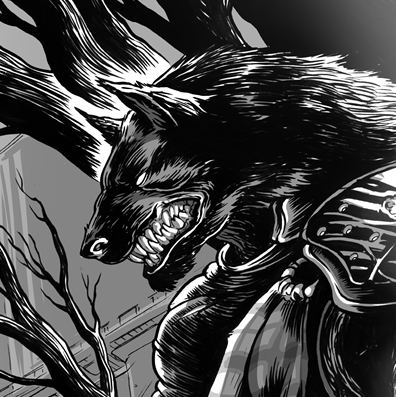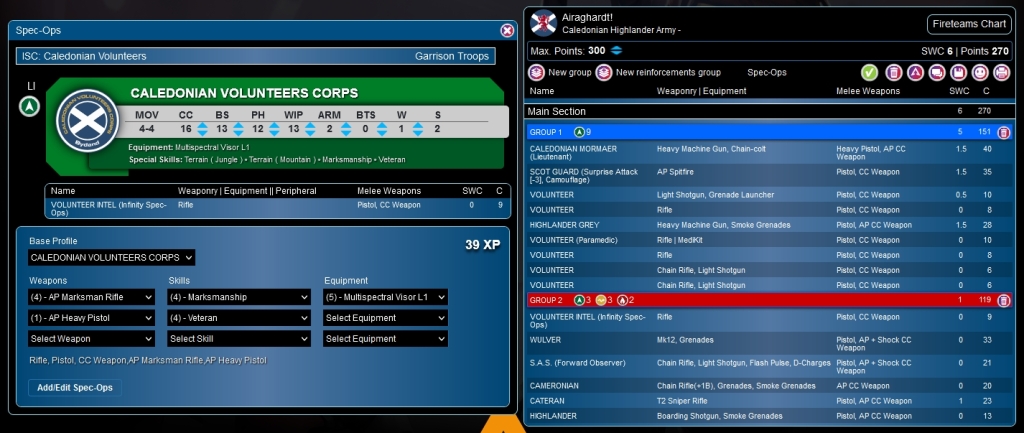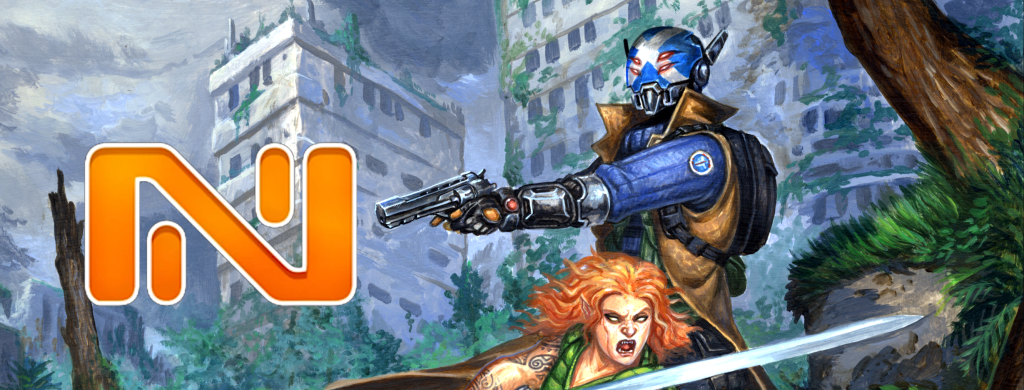AIRAGHARDT: FROM PLAY TO PAGE
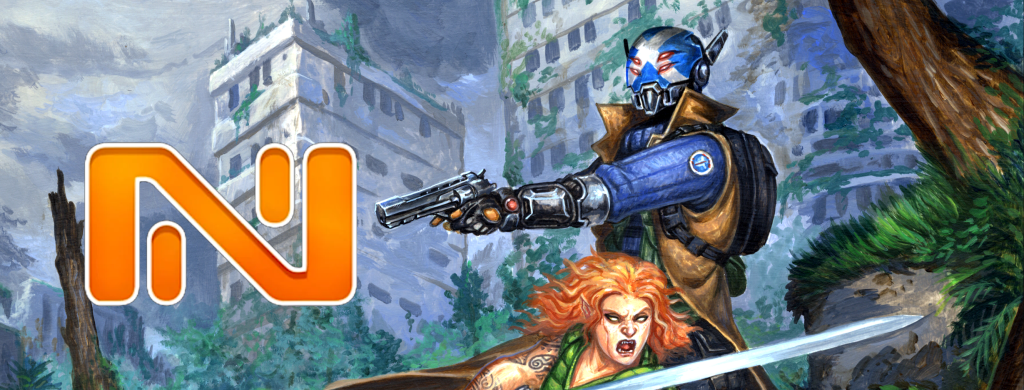
It’s safe to say that everything past this point is SPOILERS. So, if you’re still reading the book, don’t look too much farther!
“ULTIMATELY, MECHANICS MATTER.”
This is what I decided the moment I signed the contract to write for Infinity. I wanted to tell a story about my favorite factions, a fish-out-of-water tale, a weird “found family,” all that–but I knew I also couldn’t get away from bringing the manga-inspired science-fiction action to life on the page as well. I wanted the Infinity fandom to be able to look at the words on the page and extrapolate the flow of combat through ARO and two-part short skills. And to do that, I was going to need to faithfully represent the troop profiles that inspired these characters by highlighting their unique skills, equipment, and weaponry.
And so, I built a list.
Using a Caledonian Volunteer Spec-ops, I built Wil out as what he’d appear as on the page and priced him around ~37 points just to average out the list and keep things workable. He fills the spot that I’d normally bring McMurrough in, same as how Llowry, Bell, and Fionnlagh being a Boarding Shotgun instead of a Chain Rifle would add up to about one Uxia McNeill. It’s not the best list–I don’t think it’d be very competitive, all said and done–but that it had a fireteam and a host of solo operators worked great for the narrative that I wanted to tell.
I played about five games of Infinity with this list against various opponents, including myself. A lot of little rules interactions never made it into the book–at one point, Alastair tanked both saves on an E/M grenade; Fionnlagh berserk-chained through four Taigha; Saoirse CasEvac’d Alastair through suppression fire and lived; and Wil died, died, died every time I tried to use him as an active-turn Rambo piece. While the last one did bleed into the book a little with Wil’s “Pain isn’t Pain” motto and his propensity for getting his ass kicked, the rest were sadly left on the cutting room floor as the book evolved.
However… many others absolutely did. Weathering four edits, five beta readers, my editor’s edit, and all the final checks, parts and pieces of these games went all the way from the LGS table to your hands.
Below, I’ll go over some of the encounters in the book and write a play-by-play of the order expenditure and rolls that went into the conceptualization of each scene. Perhaps you might’ve even noticed the N3 rules conundrums that inspired some of them? I definitely skewed N3 whenever I could–call me a grognard, but that’s the game I played and loved and the one that was in my heart when I started penning Airaghardt.
Wil vs. Keyes, Ch7 pg56-57
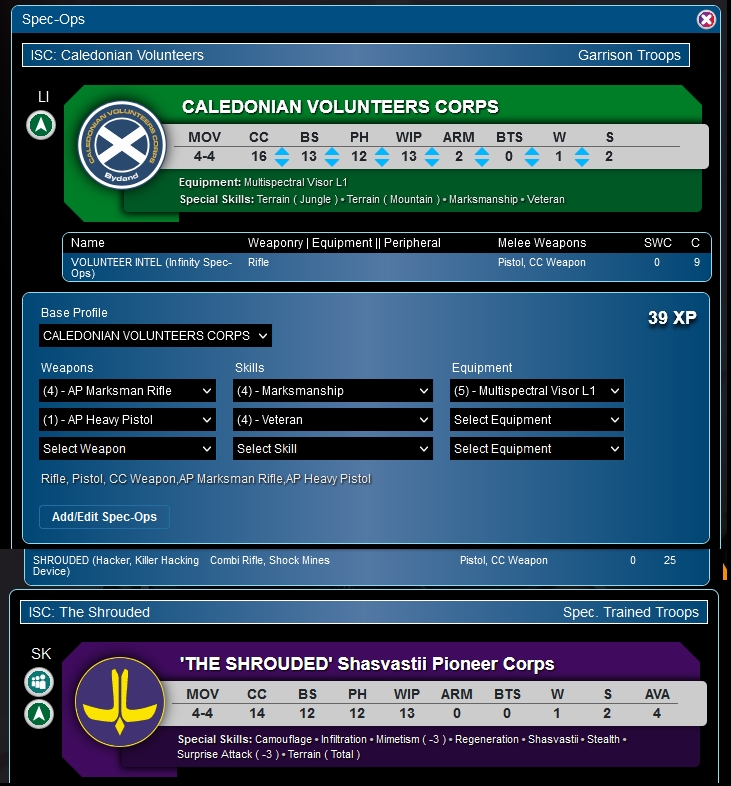
When I first decided to write this confrontation, I knew it had to be between something ridiculously deadly in the Shasvastii lore, and also, something most players had already heard of. Since Noctifers and Speculo were right out since I didn’t want to escalate too quick, I leaned on the humble Shrouded instead–specifically, the boarding shotgun profile, which I downgraded to a light shotgun for drama’s sake. And of course, Wil is using Bell’s crusty regular pistol instead of his AP Heavy Pistol, aka the Detour, to even the odds.
Of course, even when it’s 1v1, the characters should still feel like they’re playing Infinity. Giving them both 2 Orders per round sounded tight enough that I’d be forced to make sure both sides made big plays that would end the confrontation within a page or two tops, keeping the pace brisk and the action going.
From here, I’ll go over the scene line-by-line and explain the mechanics under the hood and decisions that went into bringing the game to life on the page. Hopefully you can find this brief skirmish between these characters interesting–the rest of the game played around this cat-and-mouse would later form the basis for the entirety of the conflict in Chapter 29.
So, with no further ado, let’s get into it:
Keyes jerked back. His hands jumped.
Wet, stinking fur slapped Wil in the face. Red stained his vision, covering his oculi right as he startled the Kremen up and fired twice.
Footsteps rushed away. Two misses.
Previously, Wil has approached the bothy window by declaring Move-Move. Now, he declares Move to walk into contact with the wall to see inside. Keyes is prone on the Bothy floor below the window, and reciprocal LoF is established. Keyes declares Dodge; Wil declares BS Attack with his Pistol. His MSV1 is busted at the moment and only cancels the Low-Vis, but not Keyes’ mimetism, giving him a -3 from modifiers and a +3 from range for a nice B2 at +0.
Keyes on the other hand is still suffering the -3 from Low-Vis, so he’s 9 to Wil’s 13s. Unfortunately, a critical success sees Wil losing track of his opponent as they Dodge around the wall.
Unfortunately, Wil’s out of orders. It’s Keyes’ turn now.
Fifteen rounds remained in the Kremen.
Wil strained to listen over the drumbeat of his heart. He wasn’t ready for this. Exhaustion had taken its toll on him from the infection, from his escape. Steady pangs in his abdomen bled through the rising adrenaline. His mouth was dry. Tongue, sandpaper on his teeth. Keeping the pistol level seemed an impossible challenge with the persistent shake from the cold and the twinge in his knuckles.
He stepped back. Dead leaves crunched underfoot.
The empty air around the corner of the bothy glimmered.
A shotgun blast shattered the silence. The stone wall beside him exploded, and Wil scrambled for cover, plunging behind the bothy corner and into a pile of spiny, flowering vines. The planks of a disintegrating planter box obscured beneath the green dented his ribs.
A second shot scoured the eaves from the overhang and showered him in splinters. For an instant, Wil had eyes on Keyes’ silhouette, and then he was gone again, ducked behind the cabin.
Keyes’ Lieutenant Order is spent using Recamouflage. He then edges out onto the bothy corner to see Wil. Wil knows he has a light shotgun, and knows about template mode, so he chooses to Dodge–and Keyes fires in hit-mode twice to try to cancel it.
Low-Vis kicks Keyes down from 18 to 15, and Wil goes from 12 to 9. Worse, Wil goes from 9 to 6 thanks to Surprise Attack. Miraculously, somehow, Keyes only scores one hit and one miss–the true Infinity experience, IMO, of throwing dice on absurdly high numbers and still somehow failing.
In Resolution, Wil makes the ARM 13 roll (2 ARM, -3 Cover). Failing Guts, he falls back behind the wall into Total Cover.
Camouflage. Not thermo-optical. Bioquantronic. A Shrouded—a guerilla surveillance unit dedicated to spearheading sabotage efforts. But Shrouded didn’t wear human faces, so then this was what, a Speculo Agent? The hell could they do?
Wil’s exhaustion evaporated, replaced by a rush of sickening electricity. His breath quickened, heaving in the crushed flower pile’s acidic tang. He refused the urge to make space, to flee for the forest. Gaining range would’ve been smart if Keyes wasn’t better armed. A geist-assisted shotgun’s smart ammunition could detonate at long or short range, making its threat variable and impossible to predict. Worse, he was surrounded by a field of dead leaves, and only one of their footsteps made sound.
There had to be an angle Wil could press for an advantage. Something nearby.
The Kremen? No—low caliber, no stopping power. Dive into the bothy? Close-quarters with zero cover versus a weapon optimally utilized in a choke—yeah, great idea. The animal corpse, twitching beside his leg—what he’d be in ten seconds if he didn’t do something.
A swathe of small, dark shrapnel pocked the wall. Flechettes.
He paused. Looked again. Low-tech, low-yield. No evidence of armor-piercing coating. Closer to nails than razors. Nothing like the shot he’d seen on Paradiso, buried in the walls of their checkpoint after the Dāturazi’s failed charge.
It was human-make. Light, 20-gauge tops. The shotgun from the Balena. Purpose-made to dissuade an Antipode, not for warfare. Ariadnan. Outdated. It’d only load three shells at a time.
The above is, IMO, indicative of a VERY Infinity-related interaction: Keyes’ player said he has a ‘shotgun’ in the ARO phase, and now that Wil’s player can spend orders, he’s asking questions about Keyes’ troop profile. He learns that it’s not just any shotgun–it’s a light shotgun–and about Keyes’ mimetism and stealth. Keyes’ player explains the true danger here is allowing Keyes’ to sneak around behind him for a free shot with Camo and Stealth, but Wil knows there’s also a real threat in being outranged and baited. After all, Wil’s shots can only do 1 Wound in ARO, and Keyes’ has regeneration–trading with a template is probably the smart thing Keyes will try next since these two only have another 4 orders each before the end of Round 3, and the game.
(Yeah–I’m going that abstract.)
As an aside, when Wil feels the ‘quickening,’ it’s both a Highlander reference and a signpost that his turn is about to begin. At one point I joked to Arizona Infinity that miniatures can feel when they generate an order, and this is me taking that in-joke to fruition.
If he provoked a salvo, he could close the gap before Keyes managed a reload. Jumpy as he was, cornered without a proper firearm, he’d probably mag dump anything that moved. Just needed a poke in the right direction and reflexes faster than his reload.
Wil stifled the steam in his breath as he edged to the corner. Careful, like threading a needle, he popped two shots around the bend and flinched back.
The stone clustered with nails. Grit scattered into his face, and then again.
Two shots. No third. Bait untaken. He snatched up the dead rabbit, hedged his bet, and tossed it into the clearing.
Mid-flight, it vaporized into pink mist.
All pretense of subtlety abandoned, Wil ripped around the corner and stormed Keyes’ cover. A single line etched in his HUD there indicating a possible camouflage silhouette, and he filled the space with bullets.
Wil Moves to the edge of Cover to see Keyes. Keyes’ knows that if Wil hits him twice, there’s a very real chance he’ll die, forcing a draw–and he wants to win. So instead of templating, he declares Shoot.
They trade AROs. Neither hit, neither succeed.
Then, Wil attempts a very old N3 trick, something used often long before N4 cleared this interaction up. What’s happening here is that Wil is Idling in Keyes’ Zone of Control before he declares Move in order to force Keyes to make an ARO. The only legal ARO here is Idle or Change Facing, and so Keyes’ declares Change Facing… and Wil Moves directly into silhouette contact, forcing a Close Combat.
I have done this roughly one-million times with JSA and the day I learned you can declare BS Attack without LoF and still shoot as long as it’s legal in Resolution was pretty much the worst day of my life.
Gore spattered the bothy wall. Leaves crushed and scattered without sound. Atop them, bioquantronic camouflage crackled and died, revealing Keyes’ sagged semi-human shape. His mandibles squeezed together like smashed spider legs and went limp, ejecting a sloppy wad of chewed rabbit. Violet oozed from the hole in his throat down across the shotgun, alien blood steaming in the cold.
It didn’t have a smell.
Keyes’ turn begins, and all he can do is Dodge or CC. Neither matter–the roll fails either way–and Wil successfully Close Combats Keyes with his Pistol. One DAM 11 hit sans Cover later, Keyes is unconscious at Wil’s feet… waiting to Regenerate, and make for the woods.
You can find out how that ends in the rest of Chapter 7. Unfortunately, this blog post is getting kind of long and I really want to hit another example before I cut myself off!
The Noctifer and Malignos, Ch22, pg162-164
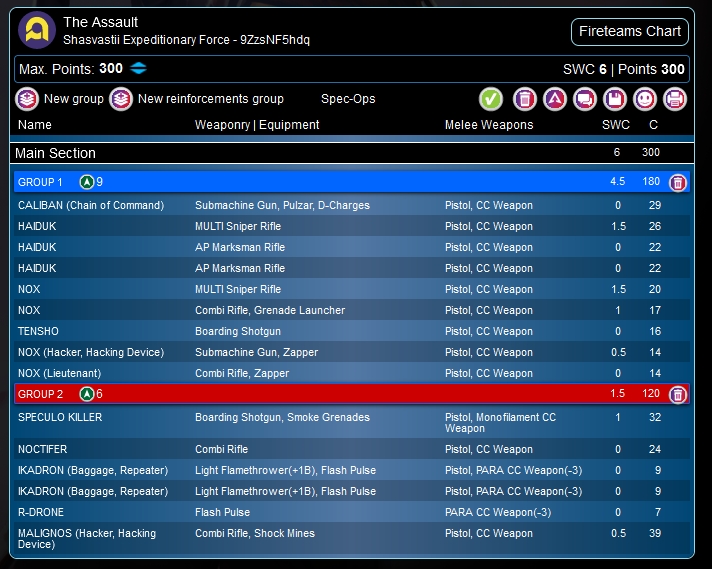
First, a little bonus: the Shasvastii list that goes up against the MacArthurs at the Brume in Ch22. Combine a Haris of Haiduk with a defensive Nox fireteam, plus a few skirmishers and an assassin, and it looked good enough to run the game mode they’re essentially playing here: Decapitation.
Canny readers will notice something interesting about this list that turns out to be really important in Ch 35. Call it my own weird brand of foreshadowing if you want. 🙂
However, right now we’re focused on just one small skirmish: Wil and Neil vs the Malignos and Noctifer in the ambush that begins the chapter. Funny enough, the interaction that inspired this back-and-forth happened in a very different game than the Decapitation match that became the rest of the conflict, so you’ll notice the profiles don’t quite match up.


This one’s a little less straightforward, but still pretty heavily confined by the rules. We begin with Bell being shot dead and Wil being thrown onto the defensive, scrabbling for cover just for a hope of survival.
Wil hurled himself onto his belly beside Bell’s still body before he could think. Two thumps soaked into Bell’s ribs and a third sheared his tweaked nose, coating Wil’s sleeve in a splash of discolored cartilage.
No reports, no muzzle flares. Just the rip of air, heralding the impacts. High-tech suppressors.
Shasvastii.
He crawled into a run and beelined for the boulders. Puffs of turf on the forest floor corralled him, forced him behind a tree. His shoulders coated in bark chips. Needed harder cover.
Rifle off his shoulder. Safety off. Loaded. He tied his belt in a knot and reclipped his holster. Wil spun up his comlog, and static roared back. Had he left Vern’s repeater range, or was this a hacker running Oblivion on him? No way to tell.
Wil checked around cover. Couldn’t establish a visual.
A hit and a successful ARM sends Wil prone in the clearing, having failed Guts with no Cover within 2″. Unfortunately for him, his opponent’s turn is now over–two orders, and then a scot-free Recamouflage thanks to Wil’s Prone state breaking LoF.
As his turn begins, Wil declares Move and beelines into cover. When neither of his enemies declare ARO, he Dodges just in case something weird is about to go down, and ends up good.
Then the problem starts: he leans out and back in to see his opponent’s Malignos and Noctifer in Camouflage and they don’t shoot. He declares Discover, and fails–just like that, his turn is already over.
No time to hesitate. Seconds to act, and he needed help. A shout would draw attention but wasn’t urgent enough. Didn’t want to chance luring someone into the crossfire. Had to make his situation crystal clear.
Wil leaned out and drilled three shots into a tree.
An instant later, the trunk beside his neck exploded. He skittered back, impact throbbing past the layers of his armor. Bad guess, but the report would bring the MacArthurs running, and he’d learned something besides: By the angle of the shot, the shooter was shifting position, using the hill as natural cover. Forcing him to turn. Opening his flank. All signs pointed to a partner, waiting in the wings for an opportunity to present itself. If Wil didn’t want to find out what happened at the end of the rodeo, he’d need to risk his neck and buck the lasso.
First, distance and cover. He launched to his feet and bolted, aiming for the buried boulder he’d climbed on his approach. Silent puffs of moss and dust trailed him but didn’t strike home, and he scrabbled into better cover. Knelt behind the granite with safety on one side, he could respond, turn the fight—
A shockwave from behind sent the leaves crazy-dancing. An ex-plosion at camp. The morning silence shattered as shouts became screams, drowned out by concentrated gunfire.
They’d been caught in an ambush.
No help was on the way. No plan from here. No use saving battery on his MSV. Wil spun up his dial, confirmed settings, and the world smeared into infrared, shapeless save for a single bluegreen silhouette crouched atop the bough of an Ariadnan fir a hundred meters out.
He knew that grim reaper getup anywhere—Noctifer. Shit. Spitfire. Shit.
But that wasn’t where the shots had been coming from.
A humanoid shape ascended the hillside, barely visible in its pur-ple hues in comparison to compared to the surrounding technicolor wilderness. TO Camo—thermo-optical, heat-shedding, designed to render multispectral technology useless. By the bucket shape of the helm, a Malignos. Legendarily undetectable. Nightmarishly untouchable. Its long coat fluttered, rifle primed, and it opened fire.
The Malignos begins to circle Wil’s Cover wide, aiming to flush him out with a failed Guts roll in order to put him into the Noctifer Spitfire’s LoF. Two orders of shooting before the Malignos goes into Suppressive and the game is halfway over.
Wil begins his turn and just goes for it. He runs. The Malignos tries to gun him down, but Wil is focused on Dodging. With his second order, having moved out of the Malignos’s LoF but remained in the Noctifer’s, he declares Discover intending to use the special Discover+Shoot maneuver.
The Noctifer reveals itself and Wil realizes he’s screwed. He expected a short-range gun, but the Noctifer is packing SWC. Luckily, its not a Missile Launcher, but… still, a Spitfire isn’t good.
Actually–the Malignos has LoF on where Wil is now. Is there another place he could Discover+Shoot my Noctifer from? No? Is it okay with you then if I have my Malignos take an ARO? Okay, thank you. They’ll both shoot. You can split burst if you like.
Wil chooses to Dodge.
(If you haven’t had this happen while playing Infinity… I don’t know how to tell you that you’ve been playing another game, somehow.)
Wil ducked back. Muted gunfire drilled the stone. Suppressing fire from the Spitfire above swept centimeters above his scalp, keeping him pinned. Their footsteps made no sound, but Wil knew the Malignos was growing closer, closer—
A red-white shape hurdled the bushes into the clearing. Neil, with his chain rifle in both hands. He staggered to a stop, transfixed by the blur that stood over his dead friend’s body.
An impact caught the kid center mass. With a flash and a spark, Neil toppled face-first into the dirt.
Wil dropped the Strela. Lunged out. Gloved fingers found Neil’s backpack strap, and he dragged him two-handed into cover.
Of course it’s the Shasvastii turn again. They move up, fire, go into suppression, play it extremely safe as they close in on their target.
Then Neil comes right through the terrain having chained together 3-4 Dodges during the Reactive turn. Finally, he sidles out into LoF of the Shas and gets shot for his troubles.
Of course, he’s ARM 1 (seriously–look it up, in a kilt and a jacket, their ARM is equal to a Fusilier’s) so he passes ARM with a natural 20 roll and willingly fails Guts into Cover.
Now, this is something that actually happened, and the explanation came about directly at the table right after the successful roll. How do you explain stuff like this in the narrative? Another challenge of directly translating tabletop to paperback, but, well, I thought myself very clever for breadcrumbing the Teseum dogtags up till this point.
But before they were totally clear, Neil sucked in a ragged breath and belted a litany of vulgarities so thick, so impossible to understand, it must’ve been what made him bulletproof. He lurched to a stand, leveraged his chain rifle over the edge of cover, and screamed, “Gie off my friend, ye bloody knock-kneed invertebrate cunt!”
The Malignos jolted back, chittering, and the crack-flash of the chain rifle swallowed it whole. Sizzling white-hot shrapnel embedded in the dirt, the trees, the hundred pureed chunks of flickering thermo-optical camouflage that’d just been a Shasvastii.
Flank clear, Wil vaulted the boulder and zeroed in on the infrared blob of the Noctifer. Deep breath. Slow and steady. Aim over speed. A Spitfire tracer sliced the fantail of his duster, scant centimeters from his thigh, and only then did he pull the trigger.
Two rounds hit the tree; one disappeared. Gore drained onto the bough below. The Noctifer wobbled, but it refused to die.
Instead, Wil’s visor did.
The heavy crack of a large-caliber weapon sent Wil to his knees behind the stone. He wrenched the visor from his face, squinting for the telltale signs of camouflage—pressure, motion, distortion. But the Noctifer was gone. The tree branch was empty.
He scanned the tree, the woods, pulse hammering into overdrive. “Neil! Where’d it go, did it jump?”
Neil panted, keeled against the boulder, and pointed. Blurry air heaped at the foot of the tree, purple blood pooling atop an invisible mound.
“Who—”
Boots crashed through the underbrush, chasing a whirl of sunfire hair. Saoirse sprinted out from the thicket, Mk12 in hand, backpack jumping on her shoulders.
Neil uses the last order in the group to go out and Chain Rifle the Malignos. Sure, it’s got regeneration, but it doesn’t want to die–and of course it biffs its Dodge.
Wil spends a Command Token to gain a single order through O-12’s Prestige and goes out to fight the Noctifer with his AP Marksman Rifle. MSV1, range, Cover, Burst 3 vs Burst 3–it comes down to luck of the dice and the Noctifer suffers a Wound.
However, Noctifers are Dogged. So it doesn’t go down.
But it’s Wil’s last order, so… it dies as the game ends. Why? Well, Saoirse shows up and shoots it in the back, of course…
Hopefully, these examples made sense and helped you see through the thin veneer of fiction into the nitty-gritty Infinity mechanics beneath.
Next time, I’ll translate some of the climactic battles of the book back into Infinity the Game, explain how I tried to characterize Natural Born Warrior versus Natural Born Warrior, and go over my math on how many Wounds a horse has versus how many Wounds a Caliban can deal in one Order.
As always, take it easy and thank you for reading!
Pre-order AIRAGHARDT on Amazon, Barnes & Noble, or direct from Winged Hussar today.
